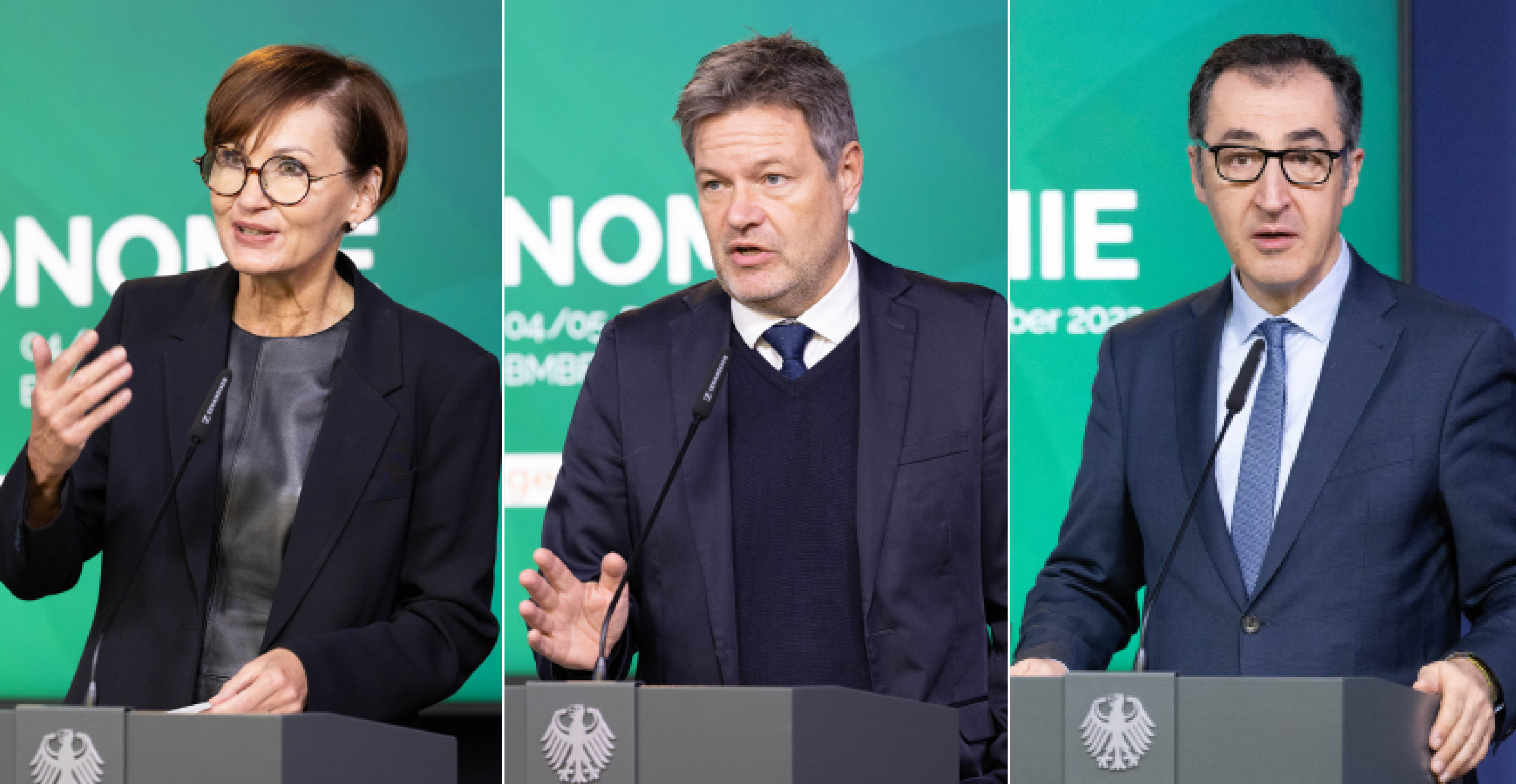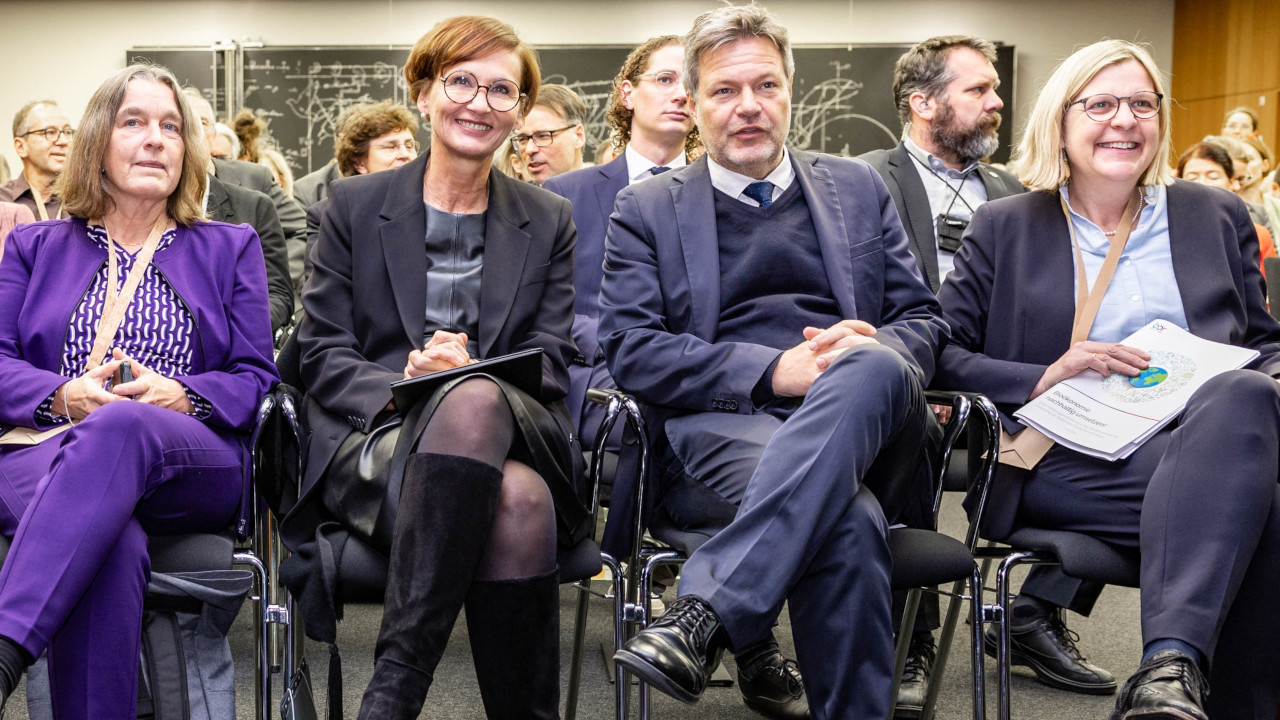Bioeconomy Forum shines with political celebrities
Three federal ministers were present at the Bioeconomy Forum in Berlin. In front of more than 200 participants, they emphasized the potential of a sustainable, bio-based economy and made it clear what is important now.

After a digital edition last year, the Bioeconomy Forum hosted by the Federal Government's Bioeconomy Council took place in person this time, and the organizers were pleased to welcome a full house: more than 200 stakeholders from science, business, politics and administration came to the Federal Ministry of Education and Research (BMBF) on Kapelle-Ufer in Berlin on 4 and 5 December to discuss the latest developments in the bio-based economy.
The content of the forum was based on the Bioeconomy Council's recommendations for action to implement the National Bioeconomy Strategy, which the independent body submitted to the German government this year. The co-chairs of the Bioeconomy Council, Daniela Thrän and Iris Lewandowski, welcomed the participants and set the contextual framework with their own keynote speeches. The event was moderated by Désirée Duray.
Advancing biotechnology in all fields of application
The event featured a remarkably high density of members of the German government: The presence of no less than three federal ministers showed the importance that the topic of bioeconomy now has in this country. Federal Research Minister Bettina Stark-Watzinger kicked off the event by welcoming the participants. "Bioeconomy is not a dream of the future, it is real and many innovations are already within reach," she said. On the way to a sustainable, bio-based economy, determination is needed to shape this area. "An important prerequisite is openness to technology in the competition for the best solutions," said Stark-Watzinger. Innovative approaches for sustainable agricultural and food systems are just as much a part of this as the production of chemicals from CO2.
"We are focusing on biotechnology and want to advance it in all fields of application." This also applies to new breeding techniques. Organic farming and biotechnology are not mutually exclusive, but can work together. "We can shape paths together here," she said. It is in the spirit of the Future Strategy for Research and Innovation to make the bioeconomy effective and to drive forward the transfer of research towards bio-based innovations. "We need strong partners for this – both at national and international level," said Stark-Watzinger, thanking the Bioeconomy Council for its work in recent years.
Upscaling the possibilities
Federal Minister of Economics and Vice Chancellor Robert Habeck also came to the BMBF to give a welcome address. On the way to a decarbonized lifestyle, the main focus is on energy generation and the transport and construction sectors. "But numerous everyday products still contain fossil raw materials. Wherever oil can be replaced by bioeconomic solutions, progress is being made," said Habeck. The production and use of biomass is subject to several areas of tension, such as biodiversity and competition for use. "Bioeconomic solutions should not exacerbate other problems."
He said that considerable achievements had already been made in bioeconomy research. Now it is important to bring innovations to market maturity with vigor. Habeck sees an important key in "scaling up the possibilities", i.e. increasingly bringing production facilities to industrial scale. Such subsidies are money well spent. The concept of cascading use also needs to be expanded more in order to close cycles. "We also need to use various instruments to stimulate demand so that bioeconomic products are also accepted by society," said Habeck.

National biomass strategy with a mix of instruments
The third member of the government to attend was Federal Minister of Agriculture Cem Özdemir. At the start of the second day of the forum, he emphasized that the bioeconomy must always be an economy within planetary boundaries. "The food-first principle is paramount," he said. The use of renewable raw materials must go hand in hand with socio-ecological improvements. Energy use should only come at the end. It is also clear that the protection of biodiversity and ecosystems must always be taken into account. "The bioeconomy must be credibly sustainable and greenwashing must be ruled out."
Özdemir spoke about the National Biomass Strategy, which is currently being developed jointly by the BMEL, BMWK and BMUV ministries and is expected to be published in the first half of 2024. A mix of instruments is planned to establish the resource-efficient production and use of biomass. "Priority is given if the use of biomass can also make a significant contribution to climate protection," says Özdemir. He sees great potential in the smart networking of biomass utilization strategies with other renewable energies, such as agrivoltaics. Filling the idea of the bioeconomy with life in a way that benefits farmers, the environment and the climate would be a gain for future generations. Özdemir also thanked the Bioeconomy Council for its work in the past Council period.
Leveraging potential along the value chain
The extensive program of the Bioeconomy Forum on the first day was dedicated to the topics of raw material transition and the circular economy. Keynote speeches and panel discussions dealt with topics such as energy and material utilization strategies for biomass, CO2 as a resource and biological plastics recycling. In the afternoon, the focus was on biotechnological innovations and the question of how they can contribute to sustainable nutrition and climate protection. The importance of scaling up well-researched technological approaches was emphasized several times in order to accelerate the implementation of bio-based innovations.
One focus on the second day was on sustainable land use. For example, farmers gave interesting insights into how they have tested agroforestry systems and agrivoltaic approaches and have now successfully integrated them into their farms. In the afternoon, the participants explored the role that sufficiency-oriented approaches and resource-efficient technologies can play in the transformation towards a sustainable, bio-based economy. One important conclusion was that there is no silver bullet for sustainable land use, but rather a variety of approaches. Clear rules for life cycle assessment are needed for bio-based innovations in order to achieve comparability. In many areas of the often long bio-based value chains and cycles, there is still plenty of potential that can be leveraged on the way to a bioeconomy.
Philipp Graf


